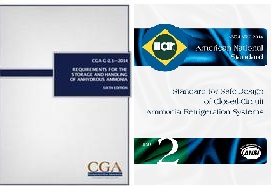Comparing RAGAGEPs: Relief Valve Sizing
It’s widely known that pressure vessels must be equipped with over-pressure protection (2015 ASME B&PVC UG-125), often in the form of a pressure relief valve. Properly sizing a relief valve requires engineering analysis which accounts for the type of over-pressure scenarios that might occur. In most cases, model codes and standards (RAGAGEPs) specify the relief valve sizing criteria that must be used. Interestingly, there can be multiple RAGAGEPs for a single chemical. This is particularly common when the chemical is used in a variety of industries. For example, anhydrous ammonia is extensively used as both a fertilizer and a refrigerant. The RAGAGEPs for these two applications are completely distinct:
- Refrigeration RAGAGEP: ANSI/IIAR 2-2014 Standard for Safe Design of Closed-Circuit Ammonia Refrigeration Systems
- Fertilizer Storage RAGAGEP: CGA G-2.1 – 2014 Requirements for the Storage and Handling of Anhydrous Ammonia

A close examination of each document reveals significantly different relief valve sizing requirements for a pressure vessel.
IIAR 2
ANSI/IIAR 2-2014 §15.3.7.2.1 Overpressure Due to External Fire
i. Pressure Vessels
The required discharge capacity of a pressure relief device for each pressure vessel shall be determined by the following equation:
C = ƒ · D·L (lb/min)
Where
C = required discharge capacity of the relief device, lb air/min
ƒ = capacity factor of the relief device, which is 0.5 for ammonia
D = outside diameter of vessel, ft
L = length of vessel, ft
CGA G-2.1
CGA G-2.1 – 2014 §5.8.6
Pressure relief valves for excessive heat or fire protection used on containers covered by Sections 6, 11, and 12 shall be constructed to discharge at not less than the rates required in Appendix A before the pressure is in excess of 121% of the MAWP of the container. Relief protection for any other reason shall use ASME UG-125, UG-126, UG-127, UG-128, UG-129, UG-130, UG-131, UG-132, UG-133, UG-134, UG-135, and UG-136.
CGA G-2.1 – 2014 Appendix A
Flow rate ft3/min air = 22.11 x A0.82
Where:
A = outside surface area of the container in square feet
Cylindrical container with hemispherical heads
Area = overall length (ft) x OD (ft) x 3.1416
Comparison of IIAR 2 and CGA G-2.1
Vessel Dimensions: 8’-0” Diameter x 40’-0” Long
IIAR 2 Analysis
C = f x D x L
C = 0.5 x 8 x 40 = 160 lb/min (2,094.24 cfmair)
CGA G-2.1 Analysis
A = 40ft x 8ft x 3.1416 = 1,005.312ft2
C = 22.11 x 1,005.3120.82 = 6,404.36 cfmair
As the analysis above shows, the RAGAGEP selected can make a noticeable difference on the final design. In the scenario above, the relief valve required under CGA G-2.1 is 3x larger than the relief valve required by IIAR 2.

Leave a Reply